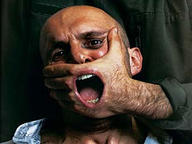Maka Jaiani, Media.ge
he facts allow us to allege that the government launched the attack on media in four directions in 2011.
First attack occurred in spring, on May 26 when the riot police beat up, insulted, detained, seized equipment and destroyed professional footage of journalists, when they were covering protest rallies of one of the opposition wings of Georgian population.
Just recently the MIA had to admit that on May 26 its officers used excessive force against journalists and will have to compensate their damage not just by apologizing, but also by paying certain financial reimbursement. Before that, May 26 2011 was described as the day of use of force against media in reports by famous international organizations like the Reporters without Borders and the Human Rights Watch.
The second attack occurred in the hot summer, when four well-known photo-reporters – Zurab Kurtsikidze, Gia Abdaladze, Irakli Gedenidze and his spouse Natia Gedenidze were detained for spying in favor of another country. It is noteworthy that the case was reflected in the relative reports of the Reporters without Borders and International Federation of Journalists.
We can use the term “attack” with regard to the detention of photo-reporters because despite the allegations of authorities that these people shared State secrets with the corresponding institutions in another country – Russia. Big part of the society still cannot understand why the authority described the transfer of the honorarium of photo-reporters for their photos to the bank account as espionage; the law enforcement bodies published a secret audio-recording where the photo-reporters spoke about the bank transfers and it was used as evidence against them.
This and some other “evidences”, together with the testimonies which the detainees finally gave to law enforcement bodies, were enough for the Court to release the “spies” under a conditional sentence. Media experts and the society, who carefully observed the process, claimed that the photo-reporters would have stayed behind bars unless media organizations unified and protested their detention actively and unless international community got particularly interested in the issue.
When commenting on the general assumption about the links between the detention of the photo-reporters and spread of photos taken during the dispersal of May 26th demonstration the secretary of the Georgian National Security Council Giga Bokeria said it was the “most obscure and deep conspiracy theory” (July 12, First Channel, Program Dialogue). He also could not understand “the forms of conspiracy” which equalized the detention of photo-reporters with the restriction of media freedom and campaign against media.
By the end of the investigation process, the story of Georgian journalists really resembled “the most obscure and deep conspiracy theory” but it did not involve Georgian photo-reporters against their homeland at all. All in all, the society and journalists made three main conclusions from this particular case: first –the government can arrest any journalist and use their cooperation with international media outlets for discrediting them; second – despite similar oppression, media is not a weak institution particularly in a county which claims to be on its road towards democracy and civil development and the third –Georgian media has two poles and unless international community interferes in our problems no victory will be achieved.
Editor-in-Chief of the Ekho Moskvi (Echo of Moscow) Alexander Venediktov hinted on this situation during his summer visit to Georgia. “Maybe, they indeed are spies, but based on the evidence provided by the authorities many circumstances remain unclear; I think our colleagues should rather ask questions instead live broadcasting of MIA statements,” he said.
The third attack started early in winter on the printed media when the Tbilisi City Hall removed newspaper kiosks with the purpose to take care of small and medium business and allowed profit-oriented businessmen to decide the fate of the printed media. Press distribution is not a profitable business in Georgia so when they tell you the tender winning companies must decide to sell newspapers or sausages in their booths; it is clear what they will choose.
If it was competition between sausages and bed-sheets, it would have been clear from the very beginning, but here we dealt with one of the fundamental human rights – information availability, which must be protected by the State. Fundamental rights, union of the most significant human rights, are protected by international law and Constitutions of various countries, including the Constitution of Georgia, which is part of the Universal Declaration on Human Rights and other international human rights treaties; though, apparently it is symbolic decision of the state.
The fourth attack occurred this year against the TV-Company Maestro, which is indirectly related with the government at first sight. The disagreement between the Maestro founders and its management organization’s founder exceeded its frames and turned up linked with the government. First of all, policemen standing outside the TV-Company’s office did not do anything but patrolling on the place; and afterwards, the MIA in fact withdrew its initial statement where the Ministry called on Erosi Kitsmarishvili [founder of the management company] to immediately leave the TV-Company office after he climbed over the fence and occupied the building.
It is not hard to guess what the authority wanted to tell Georgian media with all abovementioned facts. The Freedom House released its official conclusion on the media situation in Georgia. According to their report, despite having one of the best media law in the region, Georgia still remains on the list of partly free countries concerning media freedom.




